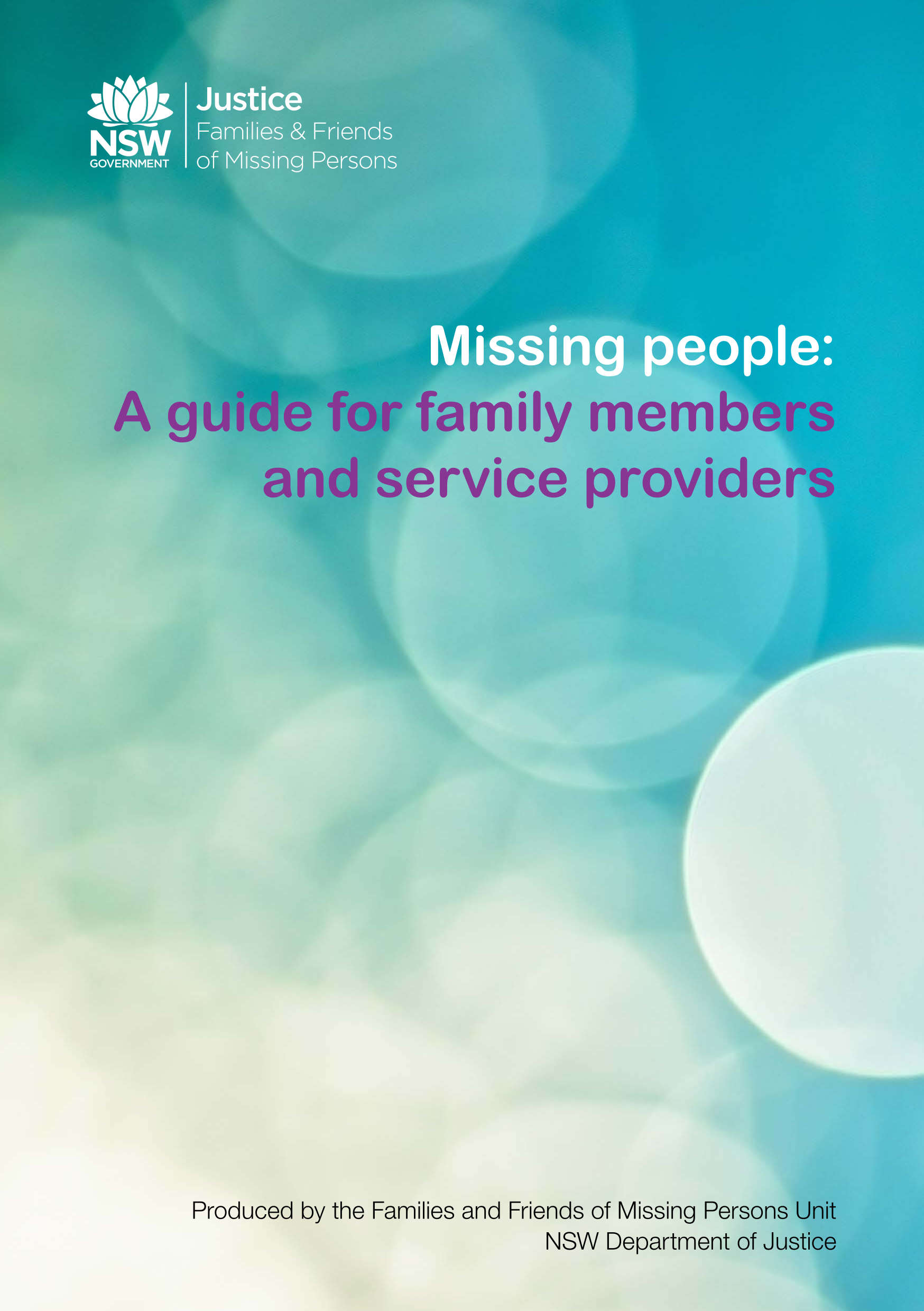This fact sheet was created by the Families and Friends of Missing Persons (FFMPU) in New South Wales, Australia. The FFMPU is a unique service that provides information, referral and support service for families and friends of the missing. The FFMPU has granted permission to CCIMA to reproduce and post this work.
Over 35,000 people are reported missing each year in Australia. That’s one person every 15 minutes. In NSW alone, around 12,000 people were reported missing during 2011. Fortunately about 99 per cent of those missing persons were located, most within a short time. Sadly, approximately one per cent of missing people remain missing long-term.
Research suggests that for every missing person at least 12 people are affected but this figure may be much higher when you consider work colleagues, school or university friends and acquaintances, neighbours and others in the local or wider community who know the missing person or their family. One person going missing may affect many others.
Impact on those left behind
There is no right or wrong way to deal with the disappearance of a loved one. When someone goes missing family and friends will often feel confused and isolated, and initially all their time and energy may be spent on trying to locate their loved one. Family members and friends can experience a wide range of intense emotions including anxiety, worry, panic, anger, frustration, sorrow, regret, shame and embarrassment. All these feelings are normal given the circumstances, but they can be very overwhelming and can result in health problems or isolation from others.
A loved one going missing may also lead to financial difficulties. Whilst it may be very difficult to continue or return to work, the person left behind may have little choice but to do so in order to meet financial commitments. In some circumstances, it may even be necessary to increase work hours.
When someone is missing for a long period, family and friends are left to cope with ongoing ambiguous or unresolved loss. They have to deal with ‘not knowing’ and uncertainty whilst continuing to hope their loved one will be found safe and well. This may be very different to the feelings of grief and loss following the death of a loved one. At the same time, they need to find a way to move forward in their lives with other family members and friends.
Things you may have noticed about your colleague
Living with a loved one missing affects each person differently. Whatever the effects it is very likely there will be some impact for the person in their work place.
They may:
- be easily upset and emotional.
- not be their usual self.
- appear distracted.
- be forgetful.
- have difficulty concentrating.
- be absent minded.
- seem tired often.
- need to take time off work or reduce their hours.
- throw themselves into work and work longer hours as a distraction.
- appear short-tempered, less tolerant or edgy.
- be less involved in what is happening at work and not as involved as they might have been before their loved one went missing.
People who have someone missing in their lives may spend a lot of time and energy searching, and also thinking and hypothesizing about how and why the person went missing, where they might be, or what they could have done to prevent them going missing.
Families and friends of missing persons often report experiencing difficulty sleeping, eating and taking care of themselves physically and emotionally. Their physical and emotional health is often negatively impacted.
When a missing person is located this can also mean that your colleague will have a whole new set of issues to face, depending on the circumstances in which the person went missing in the first place and the circumstances in which they’re found. The difficulties they have experienced do not necessarily end with the location of the missing person.
How can I help a colleague who has someone missing?
It is often really hard to know how best to help a colleague when you know they are experiencing difficulties, especially as everyone is different. It is also hard when you are trying to be respectful of people’s privacy and wanting to give them space.
How you might help:
- Be non-judgmental.
- If they have communicated their situation to colleagues in the workplace, acknowledge your awareness of it. Don’t ignore their situation.
- Be an active listener, rather than a problem-solver who gives advice.
- Avoid making assumptions about what has happened or how they’re feeling.
- Don’t speculate about what you think may have happened to the missing person. The reasons for people going missing are many and varied and often their family and friends do not understand or know why.
- Avoid well meaning comments that imply your colleague should be ‘getting over’ the loss, moving on with their life or should forget their missing loved one.
- Read about missing people and the impact of having someone missing so you have a better understanding of the issues. The Families & Friends of Missing Persons Unit website has further information.
- Ask your colleague how they would like to be supported. Offer some options, such as talking over lunch or morning tea. Ask if there are practical things you might be able to help with, such as preparing them a meal.
- Acknowledge that there might be times they would prefer to be left alone but flag that you will check in with them anyway.
- Encourage your colleague to access professional counselling and support services. Information, support and referrals can be provided through the Families and Friends of Missing Persons Unit in NSW (details listed below).
- Be supportive about their workload. Encourage breaks and self-care strategies.
- If the impact of having someone missing is impacting on your colleague’s work performance, suggest they talk to their manager to negotiate appropriate tasks while they are dealing with the trauma of missing.
- If the impact for the person is also impacting on you at work, speak to your manager about how best to manage this, or make use of workplace counselling services.
Further Information
Excerpted from the publication “Missing People: A guide for family members and service providers” developed by Families and Friends of Missing Persons Unit, (NSW, Australia).
For further information, please visit www.missingpersons.justice.nsw.gov.au.


